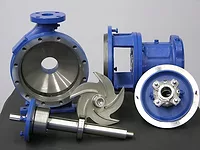The Enduring Benefits of Eccentric Disc Pumps
At that time, Frenchman Andre Petit had just graduated from the renowned Ecole Centrale Engineers’ College in Paris with a degree in engineering. Taking a job in the gold-mining industry, he found himself traveling throughout central Asia, even as far as China. He also found himself wondering how he could improve the operational performance and reliability of the industrial pumps that were used to transfer water and other produced liquids out of gold mines.
By 1906, he had perfected the answer, which he called the “eccentric movement principle” of pump operation, which he proved would succeed where other pump technologies fail. Petit was so confident in the potential of this new pump technology that he formed his own company, which he named Mouvex® and headquartered in Paris, France. More than a century later, Mouvex, which relocated its operations in 1974 to a 100,000-square-foot manufacturing complex in the city of Auxerre, southeast of Paris, remains a global leader in outfitting a wide array of industries with eccentric disc pumps for use in transfer applications that require constant flow rates, leak-free operation and accurate dosing.
Surveying the Field
As Petit began the search for a better pump design, internal gear and lobe-style were the preeminent pump technologies. These workhorse pumps proved perfectly capable of handling basic liquid-transfer operations, but both styles featured shortcomings that would ultimately compromise an operation’s efficiency, reliability and cost effectiveness over time.
Gear pumps use the meshing of their gears to pump fluids by displacement. Because of this style of operation, from day one the pump’s gears are constantly contacting each other as they move the fluid. This causes the gears to wear, which increases the clearances between the gear teeth, in the process reducing the pump’s flow capacity and volumetric consistency while increasing the probability that efficiency- and energy-robbing product “slip” will occur.
Additionally, as gear pumps wear they must operate at a higher speed in order to maintain the desired flow rate. This array of operational deficiencies will not only decrease the pump’s performance and reliability, but also increase maintenance occurrences and downtime, and the amount of energy needed to power the pump, which will result in an overall higher cost of operation.
The design and operation of lobe-style pumps forces the pumped material to flow around the interior of the pump’s casing, which allows them to offer continuous-flow and dry-run capabilities, and gives them the ability to handle not only fluids, but a wide range of solids, slurries and pastes.
However, lobe pumps also feature a series of inherent operational inefficiencies. Much like gear pumps, because of their method of operation lobe pumps will wear constantly. This wear means that the internal clearances in the pump’s housing will become greater, resulting in reduced flow capacity and volumetric consistency over time, along with an increase in product slip.
In addition, lobe pumps have two shafts that need to be sealed, which doubles both seal expenses and the potential for leakage. Also, their self-draining requires vertical porting, which can decrease volumetric consistency by 20% or more. Finally, they must operate at greatly reduced speeds in order to handle high-viscosity liquids, while they experience diminished performance when handling low-viscosity liquids.
To the Rescue
Petit identified those challenges that the users of gear and lobe pumps were facing in optimizing their operations and found a solution in the eccentric movement principle. Basically, Petit’s eccentric disc pumps feature a disc that is placed inside a pump cylinder. The disc is driven by an eccentric bearing that is installed on the pump shaft, thus creating four distinct pumping chambers that increase and decrease in volume as the disc is rotated by the eccentric bearing, producing both suction and discharge pressures as the chambers move in pairs that are 180 degrees apart. This method of operation ensures that the fluid passes through the pump at a constant and regular flow rate.
This design also means that eccentric disc pumps do not need mechanical or dynamic seals in order to operate. They do not need mechanical seals because, even though they are driven by a standard rotating drive, the off-center shaft that rotates the disc allows each point of the disc to move at the same speed. This means that the drive end of the pump’s shaft is located on a different plane than the tip end of the shaft that actually drives the pumping mechanism. Attached to the shaft are bearings that are enclosed in a hermetically sealed metal bellows or rubber boot. So, when the shaft rotates, the bellows or rubber boot does not rotate, but, rather, flexes in an eccentric circle.
Eccentric disc pumps operate similar to that of a peristaltic pump, but without the need for any hoses, which can often fall victim to their own inefficiencies. During operation, the pump’s disc is driven by the eccentric movement of the shaft, allowing product to flow through both the pump’s inner and outer chambers. This style of operation eliminates any possibility of pulsation within the pumped liquid, and since the pump does not depend on clearances to facilitate product flow, any slip is negligible. Additionally, with the pump needing no mechanical seals, there are no surfaces present where products that are difficult to seal and prone to crystallization can adhere and cause damage, which eliminates a maintenance concern.
Speaking of maintenance, eccentric disc pumps also feature simple, clean-in-place/sanitize-in-place (CIP/SIP) operation that does not require vertical drain porting. In most cases, the CIP process begins with a water flush with concentrations of different cleaning solutions, such as a mild caustic, and perhaps a reheating of solutions that are circulated through the pump, piping and valves, concluding with a final rinse. In some cases, steam is used in place of water or other cleaning solutions.
It is important to minimize the amount of residual product, especially if it is expensive or hazardous, that remains in the pump and piping prior to starting the CIP cycle. For optimum cleaning of sticky or viscous products, the flow rate through the pump is generally between 20 and 200 gpm (76 and 757 lpm) depending on the pump model, and less for thinner, easier-to-handle products.
In CIP applications, the pumps can be arranged in a series to take advantage of their unique “disc/cylinder” design. Because the pressure at the pump inlet is higher than at the outlet, the disc lifts from the pump cylinder, permitting passage of the water or cleaning solutions to flow through the pump, thoroughly cleaning the pump chambers. This unique feature eases the cleaning process and reduces cycle times so the pump can be put back into operation as quickly as possible.
In 1997, Mouvex was purchased by global manufacturer Dover Corporation and incorporated as a subsidiary to American pump manufacturer, Blackmer®, Grand Rapids, MI. In 2008, Mouvex, along with Blackmer, became a part of the Dover Corporation’s Pump Solutions Group (PSG®), a conglomeration of the world’s leading pump manufacturers. In conjunction with these changes, Mouvex has continued to refine Andre Petit’s eccentric movement principle. Today, the company offers several families of eccentric disc pumps that have proven reliable in a wide range of applications, including:
- C-Series – Designed without mechanical seals, packing or magnets, which eliminates product leakage and cost-prohibitive maintenance and downtime. Self-priming and dry-run capable with outstanding volumetric efficiency at low linear speed. Output not affected by variations in product viscosity. Clean-in-place capability allows the pump to be flushed and cleaned in place without disassembling. Designed per EHEDG recommendations and carries 3A approval and conformity with ATEX certification.
- A-Series – Features exceptional self-priming capabilities that enable dry-running and pipe-clearing. Automatic clearance make-up system maintains initial performance level over time without the need for adjustment. Constant output maintained even as product viscosities and delivery pressures vary. Can handle viscous, non-lubricating, volatile or delicate liquids with no shear.
- S-Series – Zero-leakage operation thanks to a design that features no mechanical seals, packing or magnetic drive. The transmission is protected by an FDA-approved tasteless, high-resistance elastomer sleeve. Designed for clean-in-place or cleaning by hand thanks to easy-opening operation. Ideal for base-frame mountings due to small size and low weight. 3A and ATEX approved.
- SLC-Series – Totally seal-less design with shaft “sealed” by a double stainless-steel bellows, resulting in a reduced number of pump components and easier maintenance. Volumetric performance sustains high efficiency levels, consistent flow rates and gentle liquid-handling over the life of the pump. 3A, EHEDG, ATEX and TUV certified.
- Micro-C Series – Stainless-steel construction meets the sanitary requirements of 3A and EHEDG. Small footprint allows easy integration into existing production setups. Leak-free operation without the need for magnetic couplings or mechanical seals. Self-adjusting for mechanical wear with excellent self-priming, line-stripping and dry-run capabilities. Operation is not affected by viscosity and pressure variations. ATEX certified in dry operation.
- CC20 – An excellent vehicle-mounted solution for loading and unloading road tankers. Constant and smooth delivery allows total draining of hoses, even over long distances. Versatile enough to also be used as a ground-based unit.
Conclusion
While the first industries that embraced Petit’s eccentric disc technology were those that produced tar, asphalt and bitumen, over the years the eccentric disc pump has proven to be a reliable piece of equipment for use in a wide range of industries. Today, Mouvex eccentric disc pumps are a prominent component in critical product-transfer applications in the global chemical, energy, sanitary and military markets. Andre Petit’s dream of developing a more efficient and reliable pumping technology has resulted in the creation of a pump style that, in some way, continues to benefit the world’s inhabitants more than a century after its invention.
Looking for a reprint of this article?
From high-res PDFs to custom plaques, order your copy today!






